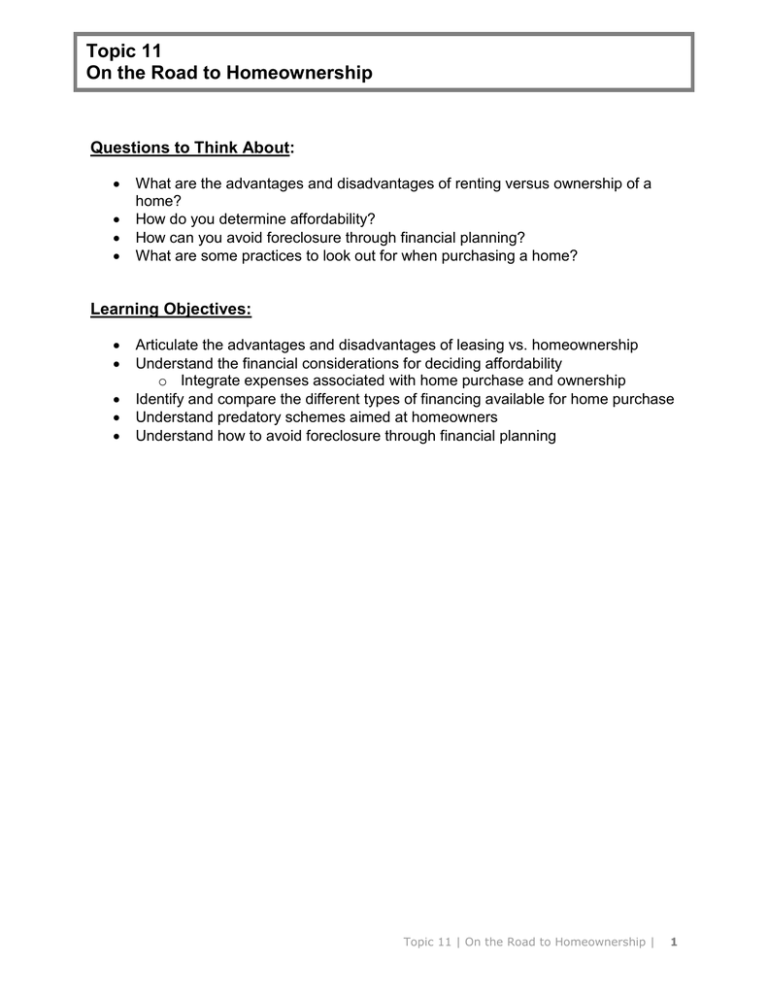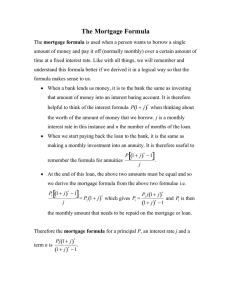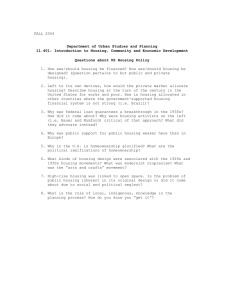
Topic 11
On the Road to Homeownership
Questions to Think About:
What are the advantages and disadvantages of renting versus ownership of a
home?
How do you determine affordability?
How can you avoid foreclosure through financial planning?
What are some practices to look out for when purchasing a home?
Learning Objectives:
Articulate the advantages and disadvantages of leasing vs. homeownership
Understand the financial considerations for deciding affordability
o Integrate expenses associated with home purchase and ownership
Identify and compare the different types of financing available for home purchase
Understand predatory schemes aimed at homeowners
Understand how to avoid foreclosure through financial planning
Topic 11 | On the Road to Homeownership |
1
Leasing / Renting vs. Buying Own Home
Advantages of Renting
Few responsibilities for
maintenance
Easier to move and relocate
Little or no investment
Disadvantages of Renting
Advantages of Owning
Build equity and wealth where
property appreciates
Tax benefits
Control over property
No equity built
Possible rent increases
Possible eviction
No tax benefits
Disadvantages of Owning
Capital investment
Responsible for maintenance
Liable for property taxes
Insurance
Less flexibility in relocating
Possible foreclosure
Topic 11 | On the Road to Homeownership |
2
COST OF PURCHASING A HOME
Down Payment – Amount of equity above what is borrowed
One-Time Payments – Closing costs including attorney’s fees, bank fees, title
insurance charges, first year’s homeowner’s insurance premium, allocated real
estate taxes if pre-paid by seller, termite and engineering inspection
Recurring Payments – Mortgage principal and interest, real estate taxes,
homeowner’s insurance, fuel, maintenance
General Guideline – Monthly housing expense should not exceed 25% - 35% of
gross monthly income depending on place of residence
Topic 11 | On the Road to Homeownership |
3
TYPES OF MORTGAGES
Fixed-Rate – Interest rate is fixed for the term of the loan
Adjustable Rate – Rate will change periodically throughout the term of the loan; borrower
should use worst case scenario (i.e. highest rate of interest permitted under mortgage
agreement to plan affordability)
Seller Mortgage – Seller holds mortgage and allows purchaser to pay on installment
Balloon Mortgage – Loan payments are made according to a payment schedule for a term.
At end of term, entire remaining balance becomes due
Interest Only Mortgages – Only interest is paid on the principal of the loan. At the end of
term, entire principal balance is due
Type of Mortgage
Advantage
Disadvantage/Pitfall
Fixed rate
Firm, predictable payment for
term of loan
Good for long-term owners
generally
May mean lower initial
payments – ideal for short
term holder of property
When rates drop, bound
by higher rate
Adjustable rate
Seller mortgage
Saves bank closing fees,
points on loan
Balloon
Lower initial payments
Interest only
Lower initial payments, full
amount paid deductible
Rate may increase
substantially when initial
rate expires – making
payments unaffordable
May apply more pressure
since this is not large
institution
Full balance may not be
available when due
Full balance may not be
available when due
Topic 11 | On the Road to Homeownership |
4
Topic 11 | On the Road to Homeownership |
5
Topic 11 | On the Road to Homeownership |
6
Take advantage of the FEPN Directory on SKC
ABC website to find homeownership counseling.
www.skcabc.org
TAX PROVISIONS & HOMEOWNERSHIP
Deductible items which will help reduce income tax:
Real estate taxes paid
Interest on mortgage or loan
Points paid in connection with obtaining mortgage or loan
Other tax provisions
Taxpayer can exclude up to $250,000 ($500,00) for married couples filing jointly) in
capital gains from income upon the sale of a home, provided they have owned and
used the home as their principal residence for two of the prior five years before the
sale.
Debt which is forgiven or canceled is usually income to the debtor who would
receive a 1099 form from the creditor. Until December 31, 2013, mortgage debt
forgiven in a foreclosure or short sale will not be treated as taxable income.
Topic 11 | On the Road to Homeownership |
7
PREDATORY LENDERS
Mortgage Scams Aimed at First Time Homebuyers
Pressure tactics to get buyer to buy home cannot afford
Refinancing loans scams
1.
2.
3.
4.
Equity Stripping Scams
Loan Flipping Scams
Balloon Payment Scam
Mortgage Elimination Scams
Home improvement loans
Common Predatory Lending Tactics
Falsifying documents
Forging signatures
Loans in excess of value of home
Bait & switch – higher rate mortgage at
closing
High interest rates
High points
High closing costs
Bogus closing fees
Negative amortization (principal
increases)
Padded appraiser’s fee
Steering borrowers to mortgage
brokers, insurance brokers and
attorneys (kickbacks or commissions
earned)
Balloon mortgages on which borrowers
were not advised
Impact of Predatory Tactics
Overpaying fees, interest
Borrower cannot afford payments when low initial payment of adjustable mortgage
expires
Over valuing property makes it impossible to refinance mortgage – if able to
refinance, it is at very unfavorable terms
Borrower cannot make lump-sum balloon payment
Damage to credit
Foreclosure – loss of equity by borrower, brings down property values in area
Incur legal fees to protect rights
Owing more than borrowed
Topic 11 | On the Road to Homeownership |
8
POLICY ISSUES
Foreclosure Prevention; Foreclosure Rescue Scams; What can be done?
Require full disclosure of relationships among brokers, lenders and attorneys
Have all appraisers post bonds or purchase insurance to guarantee their appraisals
based upon reasonable standards
Cooling off period before any foreclosure rescue plan agreement is effective
Require all non-bank foreclosure rescue plans to be reviewed by approved
counselors
Topic 11 | On the Road to Homeownership |
9
Topic 11 Exercise #1
Discussion: Participants will be asked to discuss the pros and cons of rental vs. home
ownership based on: Marital status, tax bracket, single or dual income, with or without
children, lifestyle.
Review: Compare financial impact of different rates of interest, term lengths and types
of mortgages
Topic 11 Exercise #2
Marta and Bobby want to consider buying a house because prices have come down.
Right now, the children share a bedroom, and they anticipate that each should have
his/her own room. Based on their current financial situation, how should they proceed
and what should they be considering?
Assume:
Savings from inheritance $150,000
Paid off all credit card debt
Marta’s gross weekly income $750
Bobby’s gross weekly income $827
© January 23, 2013
Cities for Financial Empowerment Fund
All rights reserved.
Topic 11 | On the Road to Homeownership | 10




